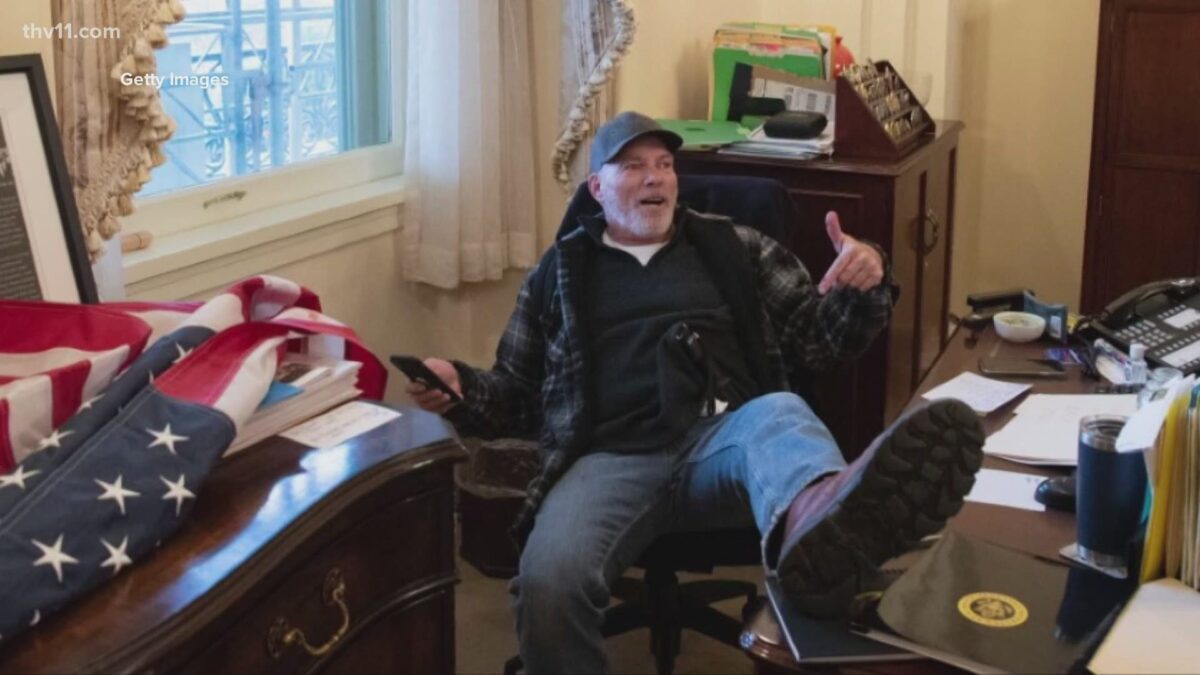
Richard Barnett of Arkansas was charged with knowingly entering or remaining in a restricted building or grounds without lawful entry; violent entry and disorderly conduct on Capitol grounds; and theft of public money, property, or records. Barnett entered a restricted area of the Speaker of the House Nancy Pelosi: Facebook
Staff Report –
WASHINGTON, D.C. — An Arkansas man who became famous for being pictured reclining with his feet on House Speaker Nancy Pelosi’s office desk in the Capitol on Jan. 6, 2021, was sentenced on felony and misdemeanor charges for his actions during the Trump insurrection and Capitol Breach, with the government arguing that his actions disrupted a joint session Congress convened to certify the electoral votes in the presidential election of 2020.
Richard Barnett, 63, of Gravette, Arkansas, was sentenced to 54 months in prison, 36 months of supervised release, and a $2,000 fine in a hearing before U.S. District Court Judge Christopher R. Cooper in Washington, according to a press release from the Department of Justice.
Barnett was found guilty on January 23, 2023, of all charges, including obstruction of an official proceeding, interfering with a police officer during a civil disorder, entering and remaining in a restricted building or grounds with a dangerous or deadly weapon, disorderly and disruptive conduct in a restricted building or grounds with a dangerous weapon, all of which are felonies. He was also found guilty of entering and remaining in certain rooms in a capitol building, disorderly conduct in a capitol building, theft of government property, parading or demonstrating in a capitol building.
After deliberating for less than three hours, a jury in Federal District Court in Washington rejected Barnett’s testimony that he had ended up in Pelosi’s office suite while looking for a bathroom and that the 950,000-volt stun gun he was carrying that day was not working.
Prosecutors argued during the trial that Barnett arrived at the Capitol “prepared for violence” and intending to stop Trump from leaving office after losing the 2020 election.
According to the government’s evidence, U.S. Capitol Police learned that an individual had entered the restricted office area of the Speaker of the House and was photographed with his feet propped up on a desk. Those photos were circulated on numerous news media platforms which identified the individual as Barnett. A search of law enforcement databases confirmed that the individual in the news photographs did in fact appear to be Barnett.
Evidence established that Barnett carried a Zap Hike ‘N Strike Walking Staff with spike electrodes with him as he traveled through the Capitol, and that he exposed those spike electrodes as various points that day, including during a face-to-face encounter with a Metropolitan Police Officer. During that encounter, Barnett threatened to call in the mob and push through the line of officers if the officer did not go and retrieve Barnett’s flag, that he had left in the officers of the former Speaker of the House.
In court papers filed before the sentencing hearing, prosecutors accused Barnett of seeking to profit from his case by selling autographed photos of himself leaning back with his foot on a desk in Pelosi’s office and by considering seeking copyright protections for an obscene note he left Pelosi that day, reading in part, “Hey Nancy, Bigo was here.”
On Wednesday, prosecutors sought to emphasize the lasting scars inflicted by the rioters. They cited Emily Berret, a staff member for Pelosi who recalled that of eight colleagues who were trapped inside the speaker’s office when the mob first overwhelmed the Capitol, six exited public service shortly thereafter.
Prosecutors also accused Barnett of lying several times in testimony during his trial, adding that he showed “brazen disrespect for every form of authority he encountered.”
“Barnett recognizes no authority but himself and is willing to do ‘whatever it takes’ to get what he wants,” the prosecutors wrote, “even if it requires harming others, stealing or breaking the law.”
Just before issuing the sentence, Judge Christopher Cooper said he was dismayed by the way Barnett had sought to cash in on his notoriety.
“You’re 63 years old; you’re too old for this nonsense,” he said. “But for better or worse you have become one of the faces of Jan. 6, and I think you enjoy it.”
Barnett was among the first defendants arrested in connection with the Jan. 6 assault and quickly became one of the best-known rioters, along with figures like Jacob Chansley, the so-called QAnon Shaman, who stormed the building in a horned helmet and was later sentenced to 41 months in prison.
Barnett has also frequently and vocally criticized the Justice Department for overreaching in its efforts to investigate the Capitol attack. He has also accused the police officers who defended lawmakers that day of instigating the assault on the building by using what he has described as “excessive force.”
His lawyers, Jonathan Gross and Bradford Geyer, had asked Judge Cooper to sentence Barnett to only one year in prison and to give him credit for the nearly four months he spent behind bars before his trial. The lawyers said in court papers that Barnett still believed the police used a “disproportionate response” during the attack.
“Barnett is outspoken about his political views and has attended dozens of rallies in his life, but was always peaceful, never violent,” the lawyers wrote.
This case was prosecuted by the U.S. Attorney’s Office for the District of Columbia with valuable assistance from the U.S. Attorney’s Office for the Eastern District of Arkansas. This case was investigated by the U.S. Capitol Police and the FBI’s Little Rock, Arkansas and Washington Field Offices, with the assistance of the Justice Department’s National Security Division.
In the 28 months since Jan. 6, 2021, more than 1,000 individuals have been arrested in nearly all 50 states for crimes related to the breach of the U.S. Capitol, including more than 320 individuals charged with assaulting or impeding law enforcement. The investigation remains ongoing.
Anyone with tips can call 1-800-CALL-FBI (800-225-5324) or visit tips.fbi.gov.
___
If you support truth in reporting with no paywall, and fearless writing with no popup ads or sponsored content, consider making a contribution today with GoFundMe or Patreon or PayPal. We just tell it like it is, no sensational clickbait or pretentious BS.













